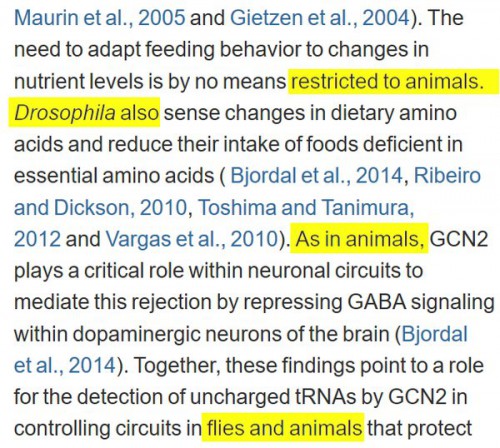I’m teaching genetics. It’s pretty much 15 weeks of pushing flies around in the lab, although I have to say I do lecture about plant and bacterial genetics, so it’s not all animal stuff. But I have learned from Cell that I’m thinking about it all wrong.
I’m now trying to figure out what kind of class this is. Am I teaching botany now? Or microbiology? Maybe flies are just ambulatory fungi now. I can never keep up with the taxonomy.
(via Björn Brembs)



Flying fungi? The Mi-Go sure got smaller since HPL’s times…
???
reminiscent of my high school band leader calling the band to perform, with the snark, “all musicians AND drummers, to the stage”*smirk*chuckle*
regardless
I’m sure “flies” were in the phrase for emphasis, not as being a different category. “Flies” to be specific, “animals” to be generic.
Still amusing, even when understood it was not a F__-up.
*smirk*
In fact, I just put this in as my first slide for my evolutionary biology course which starts this coming Monday :-)
It’s mistranslated from the King James Version, which used the correct terms “beasts” and “creeping things” :-)
It does seem absurd–is it possible that they explain this odd terminology somewhere in the introduction? As in a sentence saying, “We’re aware the term ‘animal’ has multiple uses, most often referring to species in the kingdom Animalia. In this book, however, we adopt a different definition in order to…” or something…?
Here is the reply of one of the authors: https://pbs.twimg.com/media/CaXkHtYWcAAik4d.jpg
Why do we treat
animalsflies likeanimalsflies?AnimalsFlies treat us so very well.The devoted ways they serve us
And protect us when we’re nervous,
Oh, they really don’t deserve us,
All we give them is hell!
Tell me how else man repays them —
Do we ever think to praise them?
No we don’t, and this dismays them You can tell.
We’re riddled with ingratitude,
We give no love or latitude,
In every way our attitude
Is, well, like
animalsflies.Drosophila are clearly evolved from maple seeds. You can tell from the uneven flight, and the wings.
I have long been bothered by this. It’s far more common than seems reasonable.
Just Google:
“animals and insects”
“animals and fish”
“animals and birds”
I mean, what unifying characteristic can you apply to “animals” in general, that distinguishes them all from whichever subgroup you’re isolating?
Seeing that sort of language in a scientific journal, however, is beyond the pale.
What about humans?
We use “animals” as opposite of “humans” all the time.
I teach introductory zoology (among other things). If I had a dollar for every time one of my students asked me something like “So, do humans have Hox genes, like animals?” or “Do humans go through gastrulation like animals do, or is there some other process?” I would be complaining a lot less about how little faculty are paid in this state.
Kagato @9:
From wiktionary:
Whoops, forgot to close the blockquote after “3. […]” and accidentally opened a new one instead.